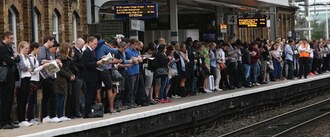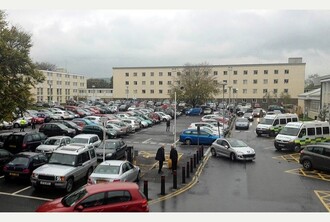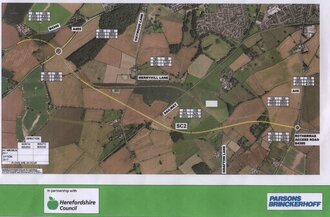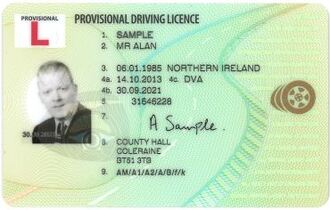-
Please stop Heathrow Airport expansion plans.Currently, all residents local to Heathrow Airport are receiving leaflets claiming there is overwhelming support for expanding capacity by building a new runway and extra facilities. THIS IS A BLATANT LIE !! In fact, many thousands of local residents have been petitioning for years to prevent this extra runway. Apart from the extra noise, it would mean the total removal of hundreds of homes and everyone who lives there. Please prove to our government that we do not want extra noise and pollution. We certainly should petition for the future of all the residents who wish to stay in their present homes, without being uprooted by uncaring commercial interests. Please sign this petition and then forward it to everyone you know. Thank you. The distribution of the leaflets claiming support for expansion, prove the interested parties behind this proposal are prepared to lie and deceive in order to persuade parliament that it has strong local support. We need to let our government know that we are wise to this deception and are not in favour of any increase in the size of Heathrow. Our lives are already blighted by the noise of planes flying overhead and we certainly don't want it to get any worse.280 of 300 SignaturesCreated by Paul Ratcliffe
-
Cycle path linking Locking areas to Weston Super Mare after tragic accidentA young girl was tragically killed in a recent accident while cycling along this road and there are ongoing concerns relating to this busy stretch of road which many parents have to cross to get to the local primary school. Many cars travel along it at 60 MPH. I think a foot/cycle path that separates people from this road and links them to a safe passage to town and local areas without worry or fear from passing traffic would be a huge benefit to the local community. With all the extra housing and development happening in the area this should have been something that was considered before planning was granted, and been included in the cost of redeveloping the area. It would encourage more people to actively walk or cycle in to town and around the local area that would otherwise drive reducing traffic and keep people active. I'm aware this has been approached before with out success but I hope they would reconsider there plans after recent events in the hope that this can be avoided again as I can't help but think this accident could, correction would not have happened if the above was in place. I see this as a good thing to spend local money on improving connections between all communities.4,105 of 5,000 SignaturesCreated by Matt Willis
-
Keep passengers safe: Don't break-up & privatise Network RailNetwork Rail was formed in 2002 after the tragic failure of the privately-owned Railtrack plc, which was heavily criticised over several fatal train crashes in the late 1990s (particularly in Southall and Ladbroke Grove where 38 people lost their lives). It was acknowledged at the time that profit-making had proven incompatible with the need to put the public’s safety first. The Shaw Report, commissioned by the government and published in March 2016, recommended that passenger safety on tracks should not be handled by any private company. Re-privatising Network Rail would be a disaster. Not only is it the unnecessary sell-off of yet another important public asset, but it is also the wilful return to the failed experiment that was Railtrack plc. It would lead to yet more fragmentation and confusion on our railways and result in rising costs for taxpayers and falling safety standards for passengers. Petition Supported by: • All on Board (Compass) http://www.allonboard.org.uk • Bring Back British Rail http://www.bringbackbritishrail.org • Campaign against Climate Change http://www.campaigncc.org • Campaign for Better Transport http://www.bettertransport.org.uk • The People's Assembly http://www.thepeoplesassembly.org.uk • Together For Transport (TSSA) http://www.togetherfortransport.org • We Own It http://www.weownit.org.uk https://s.bsd.net/38degrees/main/page/-/CBY/STOP-Network-Rail-crop.jpg18,093 of 20,000 SignaturesCreated by Ellie Harrison

-
MULTI-STOREY CAR PARK URGENTLY NEEDED AT CARMARTHEN HOSPITALThis excellent and very busy general hospital covers the whole of south west Wales - with patients and visitors having to travel round trips of up to 100 + miles. The health board has absolutely no consideration for its disabled and elderly patients nor, indeed, for any of its patients and visitors.3,050 of 4,000 SignaturesCreated by Alun Lloyd Davies
-
NO MORE BUS CUTS IN NORTH YORKSHIRE!NYCC has already made subsidy cuts to bus services of a whopping £2 million in 2013/2014 - the highest in the UK - and now it wants to cut an extra £500,000 in 2016. Buses are a lifeline for so many, for both practical and social reasons. If a person cannot drive, or doesn't have access to transport, why should they be disadvantaged further? If somebody relies on the bus to get to work, why should they worry - again - that they may not be able to get there? You never know when you may need a bus so please don't take them for granted. They are a necessity and not a luxury. Here's my story: I've been using the 31x between Easingwold and Helmsley on an almost daily basis for several years to get to work. It's clean, reliable and a safe way to get to a lovely rural part of the world that is very popular with tourists. NYCC is thinking of cutting my two regular journeys to term-time only, with unacceptable cuts to the rest of the service which will effectively reduce it to three days a week and two journeys a day - one from and one to Helmsley - and nothing at all at the weekend. You can find full proposal information here: www.northyorks.gov.uk/bussubsidy DON'T LET NYCC CUT OR FRAGMENT ANY MORE SERVICES.1,823 of 2,000 SignaturesCreated by Tracy Battensby
-
Make Hopkinstown Road SafeThere are too many injuries and sometimes deaths on Hopkinstown Road. We need some traffic calming measures at least. It is irresponsible of any highways agency to ignore this serious problem. How many times do people have to suffer loss and injury before highways authorities take notice. How many times do we have to ask?840 of 1,000 SignaturesCreated by Gareth Williams
-
MAKE WINDMILL ROAD CROSSING SAFEThe Windmill Road (B452) crossing with the A4 is acknowledged as one of the most poorly-managed, congested and hazardous junctions in Brentford. With up to six vehicles often stacked under the M4 flyover and many other cars waiting to turn right or left in the fast lane of the A4, it is the site of frequent collisions. Frustrated, angry drivers are putting lives at risk, not just other motorists but pedestrians, cyclists and above all the school children who cross the road every day. It must not take a fatality to get TFL and the Local Authority to do something to make this a safer junction for everyone.764 of 800 SignaturesCreated by Antoinette O'Hanlon
-
RE-INSTATE CALLINGTON ROAD MENTAL HEALTH HOSPITAL BUSAlthough sited within a major city Callington Road Hospital is not served by any public transport system. All other Bristol hospitals run a hospital bus system even though they have access to public transport. Many staff, service users and visitors rely on the hospital bus to connect to other transport systems.189 of 200 SignaturesCreated by wiltshire and avon health branch unison
-
Stop the Herefordshire Southern Link RoadIt is clear that this scheme (South Wye Transport Package) will do nothing to relieve traffic through Hereford as it is presented to the public. It is to unlock land (some of which is already owned by the council - therefore us) for the wholesale industrialisation of South Herefordshire with roads, industrial buildings and cheap housing. What, you might ask, is wrong with this? Doesn't Herefordshire need jobs and homes? Yes, arguably it does but the devil is in the detail. Herefordshire may need selective, attractive developments - both commercial and residential - that tie in with and support its USP of tourism, agriculture and just being attractive. What Herefordshire does not need is broiler sheds, ugly retail and industrial parks and acres of soul sapping, shoddily built hutches that now degrade and blight so much of the country. Examples of flaws: The Marches LEP says: “Scheme business cases should therefore demonstrate high value for money and contribution to economic growth, reducing carbon emissions, reducing social exclusion, improving safety and promoting health / well being”. The Parsons Brinkerhoff report to Cabinet on the Southern Link road options clearly states that “all scheme options will have a slight adverse impact on greenhouse gases due to vehicles travelling greater distances and at higher speeds.” and adds “All route variations will have an adverse impact on walking and cycling levels in the rural area, discouraging these activities by increasing severance on existing routes and loss of rural amenity through the introduction of traffic noise and proximity to traffic.” The Highways Agency were clearly fed disinfo by our council cabinet (made obvious by their response) and in a passage missing from the council report state: " ...under current guidance the building of new road infrastructure could only be justified in policy terms when other avenues such as travel planning and sustainable travel modes had been developed and shown not to address the transport needs and issues identified. We note the commitment to improve cycling and walking environments on the A465.“ No such mention of cycling and walking provision appeared in the subsequent Cabinet presentation. None of the alternative remedies have been tried. These are only some of the flaws, and others are under review by teams concerned with the resulting impact. Proper consultation has not taken place, to the extent that at least one retired couple we know of were the last to know that an add on to the scheme is due to go through the middle of their garden and ploughing through 500 yr old oak trees. Today it is their garden under threat, tomorrow it could be yours as the SLR is clearly the tip of the iceberg to the plans If you are on the outer edges of the city of Hereford, now is the time to act and lobby your local councillors and MPs. Responses should be made to Herefordshire Council re Planning Application 151314 https://www.youtube.com/watch?v=wRD8E7jNubo This kind of development will eventually destroy Herefordshire: it will destroy its beauty. It will destroy its individuality. It will destroy everything that makes it special and, worst of all, it will destroy its local, home grown businesses and local economy by making the county so unappealing, bleak and blighted that no-one with any choice will want to visit it let alone invest in it and live in it.608 of 800 SignaturesCreated by John Perkins
-
20mph speed limits and traffic control on Weston EstateWe need to bring the 20mph zones to a part of Otley that has so many young families, along with traffic calming measures and assurances from local police that they will also work alongside the council. The rest of Otley has the 20mph zones so its time to bring the whole of Ashfield in line.... lets not let it take a serious accident.140 of 200 SignaturesCreated by Gareth Dibble
-
School Buses for the children of MiltonIt is not a safe walking distance for the children. The children have to walk through rival areas which could/would lead to gang fights. There are very busy roads if the children had to walk.704 of 800 SignaturesCreated by Sarah McQueen
-
Northern Ireland Licence FeesDriving is a skill that most people will need in there life and to be charge almost double the price of the rest of the UK, Northern Ireland is being treated unfairly and it will put off people wanting to learn to drive. Not everyone can afford £62.50 for a first NI Provisional so it would be beneficial to reduce the price so that it is in line with the rest of the UK at just £32 for a first GB Provisional3,116 of 4,000 SignaturesCreated by Russell Hearn
Hello! We use cookies to improve your experience by providing insights into how the site is being used. Find out more.

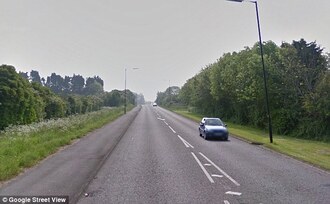.jpg)
